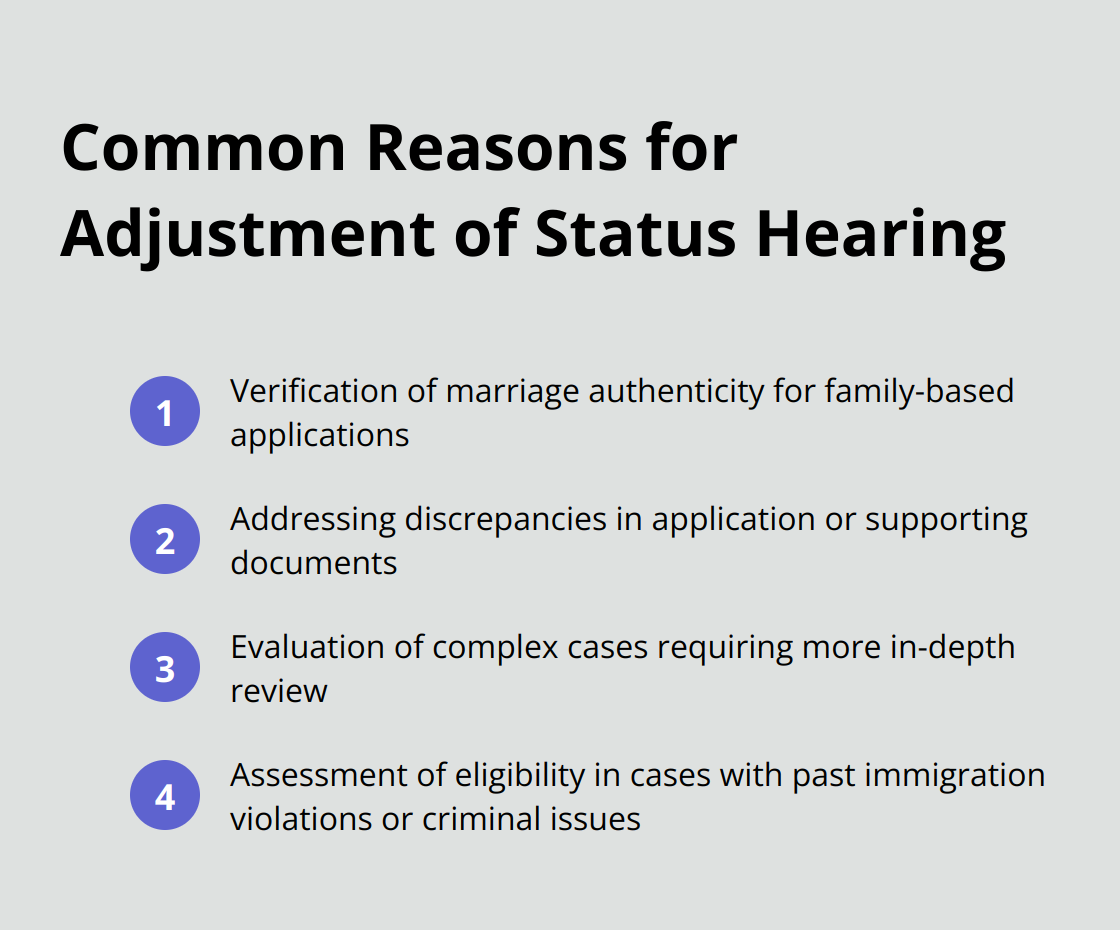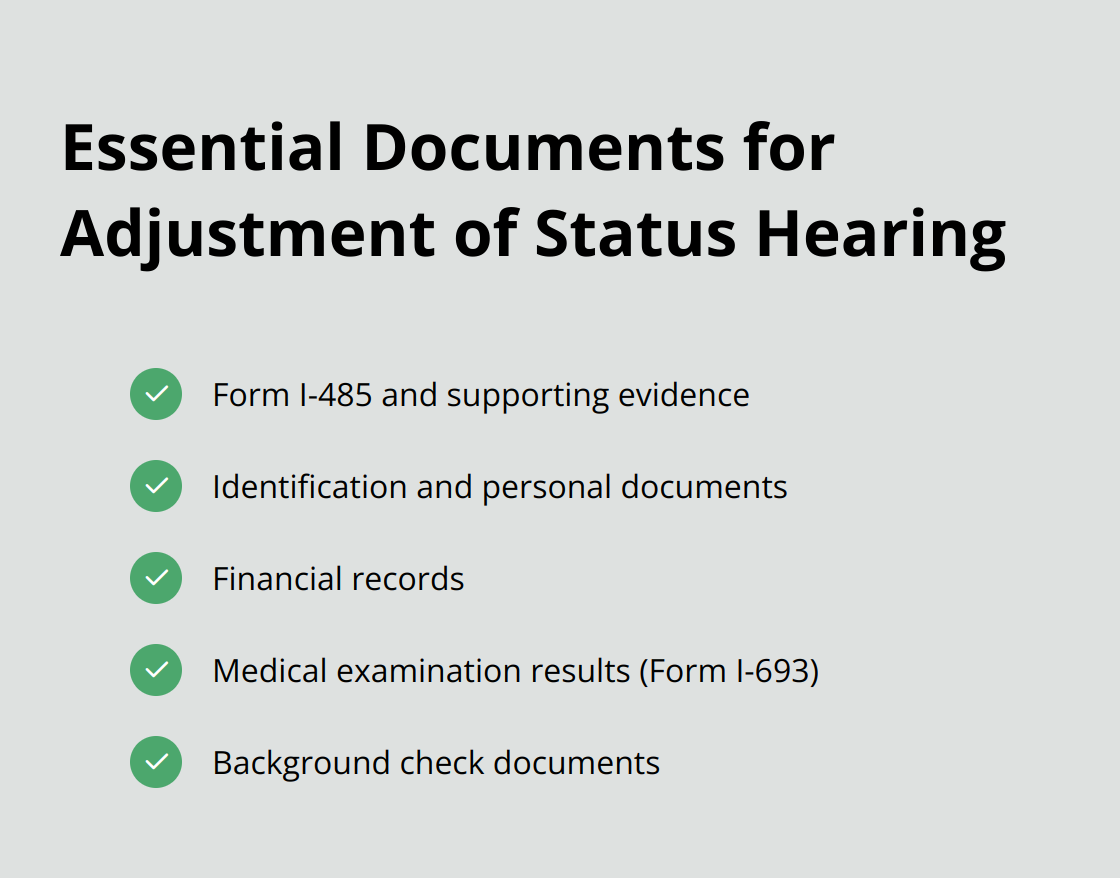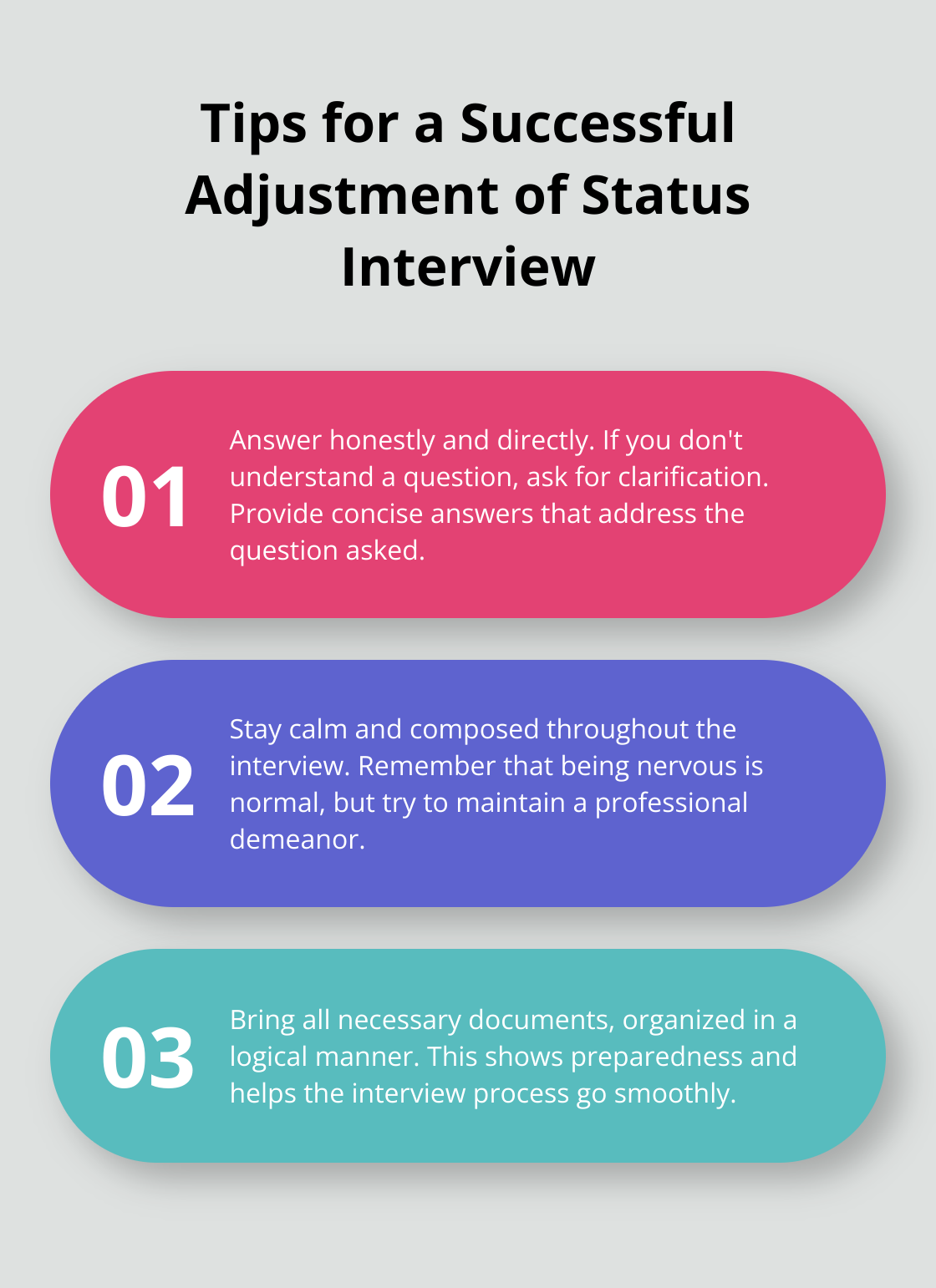
How to Prepare for an Adjustment of Status Hearing
At Law Offices of Jeffrey A. Thompson, we understand the importance of being well-prepared for your adjustment of status hearing. This critical step in your immigration journey can be both exciting and nerve-wracking.
Our guide will walk you through the essential steps to prepare for your hearing, including what documents to gather and how to answer common adjustment of status individual hearing questions. By following our expert advice, you’ll feel confident and ready to face this important milestone in your path to permanent residency.
What Happens at an Adjustment of Status Hearing?
The Purpose of the Hearing
An adjustment of status hearing serves as a critical step in your immigration journey. During this hearing, a USCIS officer reviews your application, asks questions, and determines your eligibility for permanent residency in the United States.
The primary objective is to verify the information you provided in your application and assess your eligibility for a green card. USCIS officers use this opportunity to clarify any inconsistencies or gaps in your application. They also evaluate your admissibility to the United States based on factors such as your criminal history, health, and financial stability.
Attendees at the Hearing
You, the applicant, must attend the hearing. If your application is family-based, your sponsoring relative may also need to be present. In some cases, your attorney can accompany you. Many immigration attorneys attend these hearings with their clients to provide support and address any legal questions that may arise.
Common Reasons for Hearing Scheduling
USCIS schedules these hearings for various reasons. Sometimes, it’s a standard part of the process. Other times, they need additional information or clarification. Here are some common triggers:
- Verification of marriage authenticity (if applying based on marriage to a U.S. citizen or permanent resident)
- Addressing discrepancies in your application or supporting documents
- Evaluation of complex cases that require more in-depth review
- Assessment of eligibility in cases of past immigration violations or criminal issues

The Importance of Preparation
USCIS data shows the number of forms received, processed, approved, denied, and pending by month, along with the average processing time and the number of applications. This information underscores the importance of thorough preparation for your hearing. Proper preparation can significantly increase your chances of a successful outcome.
What to Expect During the Hearing
The USCIS officer will likely ask you questions about your application, your background, and your intentions for living in the United States. They may also request additional documents or clarification on certain points. It’s important to answer truthfully and clearly, and to provide any requested information promptly.
As we move forward, we’ll discuss the essential documents you need to prepare for your adjustment of status hearing. These documents play a crucial role in supporting your application and demonstrating your eligibility for permanent residency.
What Documents Do You Need for Your Hearing?
Preparing the right documents for your adjustment of status hearing is essential. Here’s what you need to bring:

Form I-485 and Supporting Evidence
Your Form I-485 (Application to Register Permanent Residence or Adjust Status) is the cornerstone of your case. Bring a complete copy of this form, along with all supporting documents you submitted. This includes proof of eligibility for the immigrant category you’re applying under, such as an approved immigrant petition.
Identification and Personal Documents
You’ll need to bring government-issued photo identification, such as your passport or driver’s license. Also, include your birth certificate and, if applicable, marriage certificate. If you’ve been married before, bring divorce decrees or death certificates of former spouses.
Financial Records
Financial stability is a key factor in adjustment of status cases. Bring recent pay stubs, tax returns for the past three years, and bank statements. If you have a sponsor, they should provide a completed Form I-864 (Affidavit of Support), along with their financial documents.
Medical Examination Results
You’ll need to submit Form I-693 (Report of Medical Examination and Vaccination Record), completed by a USCIS-approved civil surgeon. This form is valid for two years from the date the civil surgeon signs it.
Background Check Documents
Bring police clearances from every place you’ve lived for six months or more since age 16. If you’ve ever been arrested, include court dispositions for each incident. USCIS conducts thorough background checks, so transparency is key.
We recommend organizing your documents in a clear, logical order. This not only helps you feel more prepared but also assists the USCIS officer in reviewing your case efficiently.
USCIS may request additional documents during or after your hearing. Always respond promptly to these requests to keep your case moving forward.
Now that you’ve gathered all the necessary documents, let’s move on to preparing for the interview questions you might face during your adjustment of status hearing.
How to Answer Common Interview Questions
Personal Information and Background
USCIS officers often start with basic questions about your personal information. They will verify details like your full name, date of birth, and current address. Prepare to explain any discrepancies or changes since filing your application. If you’ve moved, bring documentation of your new address.
They may also ask about your immigration history. Prepare to discuss when and how you entered the U.S., your current immigration status, and any previous immigration applications or petitions. Honesty is paramount – if you’ve had any immigration violations, address them directly and explain any mitigating circumstances.
Relationship and Family Questions
For family-based applications, expect questions about your relationship with the petitioner. If you’re adjusting status based on marriage, the officer will likely ask detailed questions to verify the authenticity of your relationship. These might include:
- How and when did you meet your spouse?
- What are your spouse’s work hours?
- Who handles the finances in your household?
Prepare for these questions by reviewing your relationship history and discussing daily life details with your spouse. Bring evidence of your shared life (such as joint bank statements, lease agreements, or photos of you together at various events).
Employment and Future Plans
The USCIS officer will want to understand your current employment situation and future plans in the U.S. Prepare to discuss:
- Your current job, including your role and responsibilities
- Your educational background and how it relates to your career
- Your professional goals and how you plan to achieve them in the U.S.
If you’re adjusting status based on employment, prepare to provide details about your job offer, including your salary and job duties. Ensure these align with the information in your employment-based petition.
Understanding U.S. Laws and Responsibilities
Demonstrating your understanding of U.S. laws and the responsibilities of permanent residency is important. The officer may ask about your willingness to support the Constitution and obey U.S. laws. They might also inquire about your knowledge of basic civic duties, such as paying taxes.
Prepare to discuss how you’ve integrated into your community and any volunteer work or community involvement you’ve undertaken. This shows your commitment to being a productive member of U.S. society.
Tips for a Successful Interview

Final Thoughts
Preparation plays a vital role in the success of your adjustment of status hearing. You must gather all necessary documents, organize them effectively, and anticipate potential adjustment of status individual hearing questions. Legal representation can provide invaluable guidance on complex legal issues and help you prepare for the hearing.
At Law Offices of Jeffrey A. Thompson, we specialize in immigration law and offer expert assistance throughout your adjustment of status journey. After your hearing, the USCIS officer will review your case and make a decision (this may happen immediately or take several weeks). If approved, you’ll receive your green card in the mail.
The adjustment of status process can be complex, but with proper preparation and guidance, you can approach your hearing with confidence. Your future in the United States is worth the effort and dedication required to navigate this important process successfully. Don’t hesitate to seek professional help if you need it.


